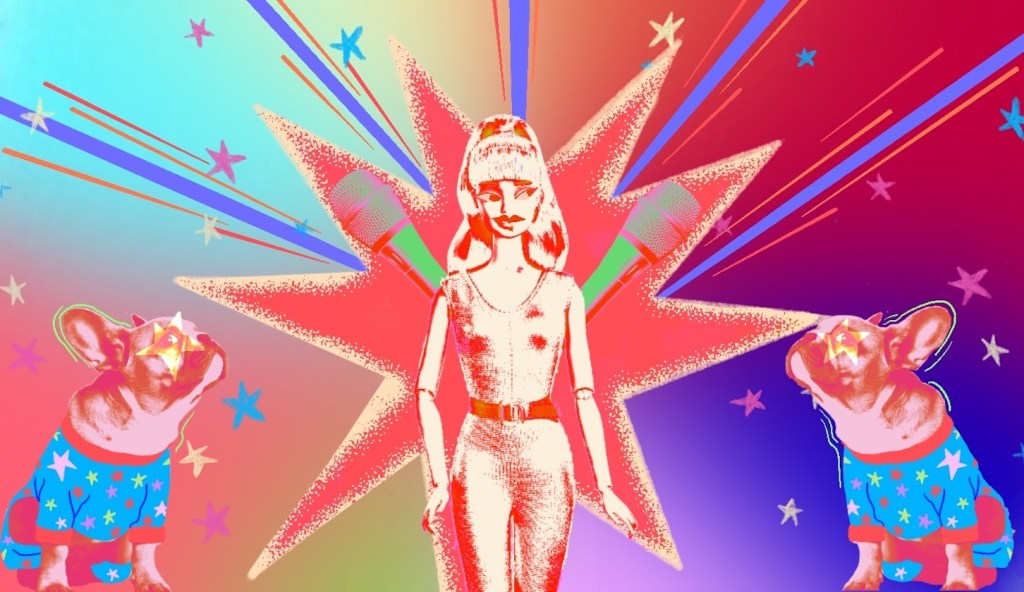Anik Khan is a Queens-based rapper who can tout a co-sign from Fat Joe and Teen Vogue alike. Born in Dhaka, Bangladesh, Khan makes work that is interspersed with references to his Bangladeshi heritage. For example, a 2018 music video opens with an overhead shot of him lying down on a yellow cab—his father drove one after moving from Dhaka to New York—holding up a flag that’s half U.S., half Bangladesh, the two halves sewn together.
His latest release brings his motherland to the forefront, with a modern interpretation of “Choturdola,” a folk tune sung by Bangladeshi singer and composer Kumar Bishwajit. The original features dhak drums and tabla, which lend a consistent heartbeat for the track. The updated version is pared down, but still could find a home thumping in a wedding hall, or emanating from the tinny speaker of an aunt’s iPad. In a nod to the original music video, antique-filtered clips of Khan’s family dancing along to the song are scattered throughout, adding a home-movie feel to the visual.
Videos by VICE
Khan credits his producers with pulling off the revival. He worked with Guy Furious and Komari, with Charlie Myles lending a hand as a co-producer and providing additional keys. Both Guy Furious and Komari have a long list of production credits, with an overlap working with Dreamville artists such as Bas and Ari Lennox.
“Guy is from London but he’s Punjabi. I wanted him involved because he understands that scale, those progressions. Komari, he’s just a musical genius in general. He’s my go-to producer for most of my music,” Khan said of his collaborators. “It was difficult to tackle because we knew we wanted to make our own version of this without butchering such a classic record.”
Khan initially planned on releasing a Bangla song later in his career. Despite a population of almost one fourth of the planet’s inhabitants, South Asian music has not found its sounds and melodies as thoroughly mainstreamed on American airways as other genres, and Khan sometimes feels pigeonholed by his identity.
As an example, he mentioned a 2018 record with Burna Boy and Sango, “Oh My.”
“The song was about falling in love with a girl and making babies,” Khan said. “What people paid attention to more was like ‘Oh! There’s a Bengali dude who made a song with a Nigerian artist.’”
He appreciates that narrative, he said, but also expressed a feeling that South Asians have to be careful about inserting their culture into the music. “We have to play such a tricky balance of too much and too little,” he said. “We’re not Reggae yet. We’re not Latin music yet.” Khan wanted to continue making the Western music he’s been making. But, as the unofficial phrase of 2020 goes, then the pandemic happened. Due to travel restrictions, Khan’s parents were stuck in Bangladesh, and Khan would regularly check in via FaceTime. “I truly didn’t know when I was going to see my father again, or my mother.” Khan said. So when his dad asked when he’d sing him a Bangla song, Khan decided there was no better time.
His choice of song is intentional. There are Indian artists who sing in Bengali, like Kishore Kumar, who are more familiar to South Asian audiences, but Khan wanted to highlight a Bangladeshi artist like Kumar Bishwajit specifically. And this specific track has been ringing in his head for decades. “It’s been a part of my childhood. I’ve seen my older sister dance to it at her wedding. I’ve seen my sister dance to it at my little sister’s wedding. It’s been a part of every single major transition of my family’s life,” he said.
For Khan, the best part aside from making it—he had to call his sister to make sure the pronunciations were on point—is his family’s response. “Just to see my father happy. Brown people love Facebook. They’ve just been going off, man.” He describes the song as a gift to his family in Bangladesh.
“To have something my father’s younger brother’s son FaceTimes me and goes, ‘Bhaiya, (brother) this shit is fire. I’ve been playing it all day.’ Seeing his twenty other friends and their Honda bikes bumping this shit, it’s a whole different experience.”
Fans of “Choturdola” shouldn’t expect the song to mark a pivot to Bengali folk songs for the Queens-based singer and rapper. Now, he says, it’s back to business as usual.




